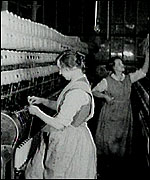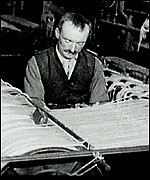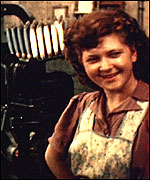|
A Nation on Film gets to the heart of Lancashire's cotton
industry through a unique collection of archive footage.
As the first country in the world to experience an industrial
revolution, Britain was ahead of the game and nowhere was this more so
than the textile industry.
With its damp climate, plentiful supply of water to drive
the mills and canal connections to the port of Liverpool, Lancashire firmly
established itself at the centre of the textile boom.
On the up
 |
| Inside a textile mill |
The invention of steam power allowed many jobs in the
textile industry, traditionally performed by hand, to now be performed
by machine.
Clips from Messrs
Barlow and Jones in 1912 carefully depict the lengthy mechanised
process of turning raw cotton to yarn.
The worker became a slave to the machine, but unlike
first feared, rather than reduce jobs, the factory system as it became
know, demanded an ever growing work force to supervise the machines.
Workers wanted
The training and recruitment of new textile workers is
captured in the documentary Cotton
Blossoms in which new recruit Mona proves that threading a shuttle
is not as easy as it looks.
 |
| A hard and long working day |
Recruits may have been plentiful, but working conditions
in the mill were harsh. Workers faced stifling temperatures, air thick
with dust and long working hours.
In the music and dance clip from 1946 Chasing
the Blues, steps are taken to rectify and help improve working
conditions in some of the mills.
Painting the interiors of the mills, the addition of
first aid rooms and new canteens for workers to rest were all part of
the developments and are showcased in the clip Lunchtime
at the Mill and First
Aid.
Slumming it
At its peak, over 750,000 people were employed in the
cotton industry. Workers moved from the land to the industrial towns and
cities to seek better paid employment in the mills.
 |
| Hard times - housing was often substandard |
But better pay didn't always result in better living
conditions. In the silent film Slum
Clearance (1938), the legacy of the poorly built, unplanned terraced
housing is on show as inspectors measure and record conditions in preparation
for improvement.
To escape the harsh working and living conditions, mill
workers knew how to enjoy themselves and any occasion was an excuse for
a fair.
Whilst wakes weeks were often spent at Blackpool as captured
in the 1935 film Happy
Memories, Great
Harwood celebrated the Queen's Coronation with a weight lifting
demonstration in a clip from 1953.
In decline
If the rise of Lancashire's cotton industry had been
swift, then by comparison, the fall was painfully slow. The First World
War saw the onset of a decline which would span the 20th century.
Crisis
in the Textile Industry (1952) charts the industries decline as
mill workers collect dole and the word recession makes an unwelcome return
to the mill worker's vocabulary.
Through the good times and the bad, A Nation on Film
captures and explores life in the North West's textile industry and invites
you along for the journey.
|

